- Home
- Sherwood Smith
Time of Daughters I Page 2
Time of Daughters I Read online
Page 2
Mother took her by her bony shoulders. “I know you’ll do well.”
Danet, whose throat was too tight for speech, searched her mother’s eyes, not sure if the glisten there was her imagination. Then Mother lifted her hands and turned away.
Hliss hugged Danet, whispering, “Write to me.”
Danet promised, in a voice that sounded strange to her own ears, that if she could catch any runners going in the direction of Farendavan, she would.
They rode out.
Danet soon discovered that Gdan, the runner, was much like Mother: disciplined, straightforward, with no sense of humor. She appeared to be maybe ten years younger than Mother, in her middle to late thirties, light brown of skin, eyes, and hair, her only prominent feature a hawk nose.
As for Gdan, by the end of their first day’s ride, when she saw that Danet dressed down her horse and cared for the bride gift mares before she did anything else, and did it well, she decided this girl would do, and unbent enough to answer the few questions Danet dared to put to her.
So on the rise westward over rolling countryside, where the sounds of harvest songs drifted on the air as people worked their fields, Danet learned that Gdan was runner to Sdar-Randviar—the woman Danet would one day replace—and though Gdan would not talk about her expected duties (that was the jarlan’s prerogative) or about people, she did like talking about the horses and stables.
As Danet loved horses, riding, and anything to do with How Things Work, they found enough to discuss to keep the ride from becoming awkward.
They crossed the Tirbit tributary and turned their backs on the mountains Danet had grown up seeing—turned their backs on her home, and its familiar territory, and on Embas the Miller.
She kept her regret to herself, and tried to look ahead to her new life as they rode steadily west, until Gdan pointed out three hills surrounding Nevree, the trade town that the Olavayirs had made their capital.
Danet noted that Nevree’s river, like its castle, was four times as broad as the Tirbit in full flow, cutting through the land to bend around one of the hills, the other two hills rising on the north side. Atop all three stood lookout and signal towers.
That, Gdan explained, was where the boys did their first watches away from the castle walls, and Gdan added in a dour tone that in his early days, with his first two sons, the jarl sometimes set Riders to make sneak attacks, and if the boys on tower watch didn’t catch them, the boys wouldn’t be able to lie on their backs for days.
Danet, after a lifetime of divining extra meaning from her mother’s sparse words, got the sense that Gdan wished the same thing was happening these days, maybe to certain people.
The night before Danet’s departure, her mother had warned her not to expect any special notice. That way, anything she got would be a pleasant surprise. So Danet firmly told herself she did not expect an outrider welcome, but she was gratified, and secretly relieved, to spot the dust of a full riding on approach.
The first thing she saw was the blue and yellow snapping heir’s pennon; then individuals resolved out of the dust. The one drawing the eye was a big fellow—much too big to call a boy, and probably too old as well—he was enormous, with heavy shoulders whose slope the layered shoulder spaulders common to men’s coats didn’t hide. He reminded her of a war horse, with the straw-colored hair so common among Marlovans. His mount looked too small for him, until she noticed the huge chest and the long legs and the hooves like plates. The rider was so large he made his horse look small.
Gdan said, “That’s Jarend-Laef.”
The Jarl of Olavayir’s eldest son! His horsetail made his long face look longer, a face dominated by the biggest pair of buck teeth she’d ever seen.
“Danet Farendavan?” he asked. His voice sounded like it came from the bottom of a well.
“I am. Well met, Jarend-Laef,” she said, touching two fingers to her chest in salute.
He uttered a rumbling laugh, then said, “Came out to meet you, hur hur. Arrow said I should, hur hur.”
“Arrow?” Danet asked.
Another chuckle. “That’s m’brother, Anred. But we don’t say Anred, we say Arrow. On account of his mouth is shaped like an arrowhead. And because we got Uncle Anred and a cousin, too, but, hur hur, we all call him Bat, hur hur.” He chuckled again, then wiped his sweaty face on his arm, leaving a big smear. “Arrow has the hill watch today, so he said, come out and meet you, soon’s the perimeter rider saw the pennon.” He pointed to the limp blue and yellow flag Gdan carried on a pole, much smaller than the heir’s pennon, of course.
And though Danet couldn’t perceive anything whatever in that to laugh at, he chuckled some more as he fell in with them. He then asked a lot of easy, obvious questions that she suspected he didn’t really hear the answers to, as his expression of good humor never changed; for his part, he found his brother’s new wife to be easy to talk to, clear in her speech. Always glad to like anyone given a chance, Jarend did his best to welcome her by helpfully pointing out everything she could see for herself, and Gdan, riding silently behind, approved of Danet’s manners as she thanked him, or commented appropriately.
It was nearing sunset when they approached the castle’s outer wall. The whole, with its three rings, looked to Danet like the biggest hive in the world, with gray-clad bees buzzing in and out and crawling along the walls.
The old city lay along the river, most of it now warehouses and counting houses, with a guard outpost.
As they approached the outer gate, Danet kept her hand ready, watching to see what Gdan did about saluting: she knew from her one trip north over the Andahi Pass that some Jarl Houses expected saluting all the time. Her cousin Hadand Arvandais had warned Danet that they ordered floggings for those who forgot, for awareness of rank was a part of good order.
The Olavayirs, for all their reputation for trouble, did not seem to share that attitude. The gate sentries didn’t move, except to brush a couple fingers over their hearts, to which Jarend made a lazy wave. Gdan didn’t salute at all, so Danet shifted her reins back to her right hand.
Between the first wall and the second lay the city proper, shops closing up and others opening, eddies of cooking food aromas waking up her stomach. She stared at unfamiliar busy streets, so unlike their single street village in Farendavan. There were still round Iascan houses here and there, and the traffic as merchants ended their day and the riders’ watch changed intimidated her. It was a relief to see familiar coats of Rider gray on the patrollers, horsetails bobbing down their backs.
Between the second and inner walls was the garrison and its stable. The inner wall surrounded the tallest part of the castle, what Jarend called the residence, where the family and most of the staff lived.
They rode under a third guarded gate, and here again exchanged the same casual salute. When they reached the stableyard—which was five times the size of Danet’s—she felt as if a dull gray-blue whirlwind descended, runners beckoning her one way, the horses taken another way, Jarend and Gdan talking to people. Danet’s Firefly was firmly led off, and another runner took her saddlebags.
A girl about Hliss’s age said to Danet, “This way.”
At first she was glad to stretch her legs. But the more stairs she climbed and halls she walked, the more she worried she’d get lost forever if left alone.
They entered a room that smelled of stale rye biscuits, and Ranor-Jarlan, a solid woman with flyaway gray hair, shot Danet an assessing glance as Danet laid hand to heart in salute.
“Danet? You don’t have a personal runner?”
It was not a real question—more of a statement, as if a possible runner might be invisible. Danet said, “My sister and I shared our mother’s at home.”
“This is your home now,” the jarlan said in a brisk voice very like Mother’s. “As well you did not bring one. So much harder to retrain outside runners to our ways. When you settle on someone who suits you, speak up. Until then? Nand, get her situated. When Arrow rides in, see t
hat they meet.”
And Nand whisked Danet right out again.
The rest of that watch passed in a blur. Danet was shown to her room—her own room, with a bed big enough for two, a carved trunk for her clothes, a plain table and two sitting mats. Her attention stayed on the size of that bed as longing squeezed her heart. She missed Embas fiercely, but she knew he would never ride cross-country in order to see her. She wondered who would lie in that big bed with her, and what the customs were among the Olavayirs.
But Nand didn’t linger long enough for questions. She swept Danet off to see where the baths were, and the stable where the women worked, and finally to the family mess hall, a smaller chamber up and to the right of the castle mess hall.
A single bell tanged: that had to be the evening watch change.
Danet discovered that everyone had their place. “The jarl’s riding up around Andahi Pass,” was the last thing Nand said to Danet before pointing out that she was to take the guest mat opposite the randviar, and then disappeared downstairs to the runners’ own mess. An empty mat sat to the right of Danet.
She wondered who would sit there, and looked down the loaded table to the other end. Mother had told Danet that the jarl’s randael—his brother—was dead, and there was his empty mat to the right of the jarl’s empty mat. Danet wondered who commanded the Riders, but she kept quiet, having been trained to listen and speak only when spoken to when in new situations.
Sdar-Randviar sat down across from Danet, and they silently assessed one another. Sdar-Randviar appeared to be the jarlan’s age, a generation older than Mother. The two women had to be in their sixties, the randviar a plain, straight-backed woman with graying hair streaked with rusty red.
Danet had just cut off a piece of fried fish from the big platter when in sauntered a skinny young man a few years older than Danet, splashed to the knees with mud, and smelling of horse. He folded up on the mat beside her. This had to be Arrow. They studied one another.
As his brother had said, Arrow had a mouth shaped like an arrowhead, an upside-down V. She thought he was frowning, but when he spoke she discovered behind his short upper lip a pair of sizable buck teeth. She wondered if he hated showing those two big teeth, so kept his mouth shut except to talk, unlike Jarend, always chuckling, hur hur hur.
She had been expecting another big fellow. But Arrow was spare in build, as if (she thought to herself, longing to write this observation to her sister Hliss) someone had taken half the makings of a boy out of him and stuffed the extra into his brother.
He was blond like his brother, skin the same brown as her own, eyes typical Marlovan bluish-gray, the shade of faded runner coats.
Arrow looked at her, wondering if she were smart, and if he’d be able to trust her with his father’s plans. Only time would tell for that. As for her appearance, she wasn’t any comparison to Fi, his current lover, as troublesome as she was tight. This Danet was plain and skinny. Like him.
He tightened his mouth to hide those damn teeth, hoping she wouldn’t find him disgusting, because Father wanted children as soon as they could get them, and who knew if the Birth Spell would ever come again in the family. It hadn’t for Aunt Sdar.
But anything could be managed as long as Danet didn’t fall for Cousin Lanrid.
“Good ride?” he asked, then bit into a cabbage roll.
“Yes,” she said, aware she was staring, so she glanced down the table again, wondering if those in the middle were cousins, and if one of them might be Hliss’s future husband, the one Jarend had called Sinna during that long ride to the gate.
She was about to venture a query when the jarlan addressed them in her abrupt way. “I asked Tdor Fath to organize your wedding.”
Tdor Fath—her birth-family name appended to distinguish her from several Tdors—was Jarend’s wife, a tall, needle-nosed woman with thin braids like combed flax. Danet looked at her with interest, but didn’t recognize her from the Faths she’d met at the horse fair a few years before.
Tdor Fath didn’t say a word, just looked from the jarlan to Sdar with pale brown eyes as the two elder women in quick, practical tones fit the wedding into the castle schedule as they would a shoeing or an all-castle drill.
By then everyone was done eating. Arrow figured talk with Danet could wait until everybody else wasn’t snouting in—and anyway, he had Fi to deal with, now that news of his wedding would be spreading. He’d told her at least twice that he had to marry for the family, but nobody ever said no to Fi, and she’d refused to believe him.
He took off, leaving Danet to head tiredly for bed—alone—where she lay staring at the two slit windows and the bare walls, and tried to compass the idea that this room would be hers for years and years, until she became randviar. She fiercely blinked back homesick tears, firmly told herself to look ahead, and wondered if she could at least get some hangings.
THREE
The unfamiliar sound of bells echoing off stone woke her at dawn. Nand had told her the women drilled before breakfast—no surprise there—so Danet did her best to remember how to get to the drill court she’d been shown. She could hear men’s voices shouting in cadence over a stone wall.
The randviar led, and Danet discovered that her mother’s drills, which she’d told the girls countless times came straight from her Vranid grandmother, who had served as second-generation defending commander at Ala Larkadhe during the Venn War, were much tougher than the Olavayir drills. She discovered that the Olavayir women didn’t even do the odni, or double-knife fighting drills, except in the knife dance invented late in the last century, it was said by the great Hadand Deheldegarthe herself. Olavayir women didn’t wear wrist knives except to ride the border.
Instead they did a basic hand-to-hand warmup, then went straight to riding and shooting in a circle in the corral. Danet could put a leg over any horse they gave her, but her shooting had never been great, and with so many watching eyes, she shot worse then ever. At least she hit somewhere on the target three times at canter, but she didn’t come anywhere near the red.
Still, the jarlan, watching from the barn door, said nothing dire, just that Danet would ride out on her first border patrol after the wedding.
And so her new life began.
At first she was always going the wrong way, and always late. Even when she knew where she was going, everything was so far apart it took longer to get there. Then she had to get her own gear clean and ready, as she had no runner: she never saw Nand again, except at a distance, and she wondered if the girl was in one of those families who’d thought they’d marry someone to Arrow. There was some atmosphere here she couldn’t define, except she felt she was being watched.
Her second night she found out where they kept the big barrels full of water enchanted to remove dirt, unsurprisingly located just off the baths, with lines stretched between posts in a court outside, for drying one’s laundry. After the evening meal Danet ran down to start dealing with her pack of dirty travel clothes, when everyone else had liberty.
Arrow was gone all the time, and no one else spoke to her beyond immediate tasks. She saw him at meals, but now he sat next to his brother to the right of the empty jarl’s mat, and he always arrived at a rush and was first one to leave.
A few days later, she spotted him and a startlingly beautiful girl with long, loose black hair worn over floating silks. They were coming down the hall from the opposite direction; this was how Danet discovered that Arrow lived on the same hall. The girl was clearly a lover, and not a Marlovan one.
Danet was carrying an armload of freshly sun-dried underclothes and stockings, but she thought, might as well begin on a friendly note, and started toward them.
The girl stopped, twined her arm around Arrow’s neck, and said in accented Marlovan, “Is that her?”
The “her” was said with so much venom that Danet stopped short, appalled.
Arrow turned red to the ears. “Yes, that’s Danet. Fi, you know how it works with us....” He opened his bedr
oom door and towed her in.
Fi sent Danet a nasty glare over her shoulder from those wide blue eyes, then liplocked Arrow, nearly causing the two of them to slam into the doorframe. Arrow got her inside and the door shut.
Ugh! How could someone so handsome have such terrible manners? Danet retreated to her room, determined to shrug off the feel of that venom. Just because that obnoxious Fi wanted to give it didn’t mean Danet had to take it. Maybe this Fi wanted one of those outlander love matches you heard about. But Arrow hadn’t said anything to Danet about how he was lifemates with this Fi, and he’d had plenty of chances.
Danet prowled around her room once or twice, then ran down to take another bath. Scrubbing her skin warm and breathing the scent of steaming water helped rid herself of the Fi feeling.
The wedding had been set two weeks on. The days passed quickly, everyone busy. Danet spent most of her time learning how to navigate the castle and its environs, and exercising Firefly once morning drill was over. Here and there she overheard bits and snatches of conversation, mostly as the delicious smell of almond cakes drifted along the hall near the bakehouse, which were only brought out for festival days, weddings, and Name Days.
Danet got the impression that Jarend’s wedding had been planned for months. But he was the heir, and Tdor Fath was first daughter of the Fath Rider captain eastward in Tyavayir. They’d also made a festival of the Name Day of their little son, whom they called Rabbit (if you are guessing at big front teeth, you would be right) a not-quite-walking baby.
The day before the wedding, the jarlan sent out a party of teenage girls to gather boughs to hang up in the Hall of Ancestors. The jarlan also issued an order for beeswax candles instead of the usual leddas-oil torches. That was all the decoration, but for Danet it was enough. Boughs were customary at any wedding, no matter who, and the candles made it respectable. She hadn’t hoped for anything beyond that.
The morning of her wedding, Danet encountered Jarend’s wife Tdor Fath on the way to the baths, when she spoke to Danet for the first time.

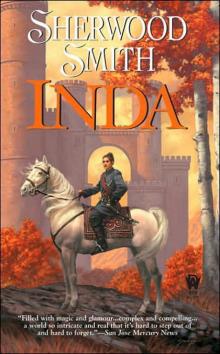 Inda
Inda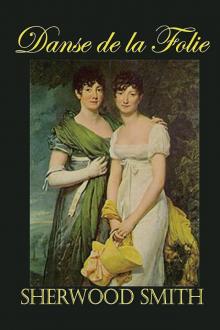 Danse De La Folie
Danse De La Folie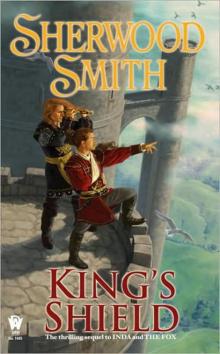 King's Shield
King's Shield Whispered Magics
Whispered Magics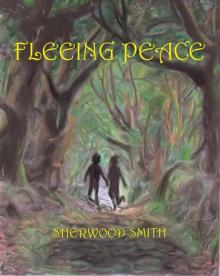 Fleeing Peace
Fleeing Peace Barefoot Pirate
Barefoot Pirate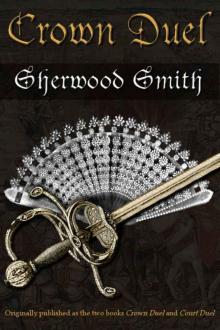 Crown Duel
Crown Duel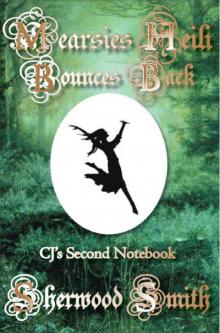 Mearsies Heili Bounces Back
Mearsies Heili Bounces Back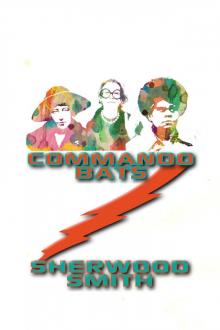 Commando Bats
Commando Bats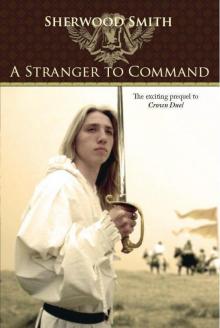 A Stranger to Command
A Stranger to Command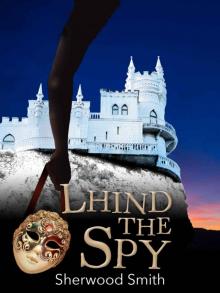 Lhind the Spy
Lhind the Spy The Spy Princess
The Spy Princess Blood Spirits
Blood Spirits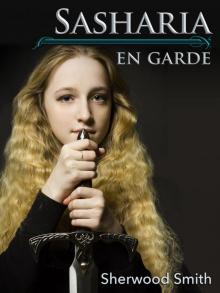 Sasharia en Garde
Sasharia en Garde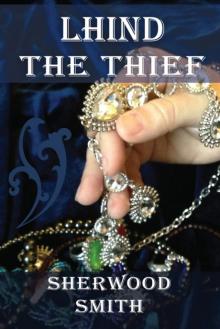 Lhind the Thief
Lhind the Thief Paradise Drift
Paradise Drift Banner of the Damned
Banner of the Damned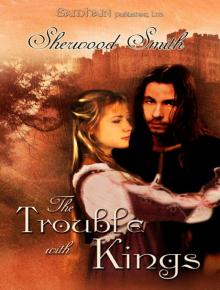 The Trouble With Kings
The Trouble With Kings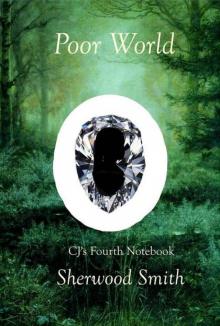 Poor World
Poor World Treason's Shore
Treason's Shore Wren Journeymage
Wren Journeymage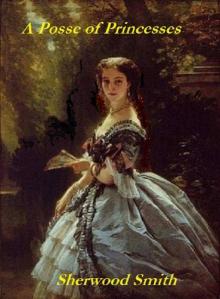 A Posse of Princesses
A Posse of Princesses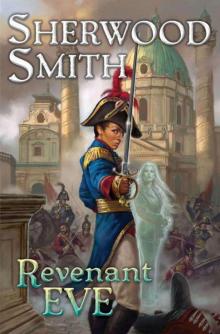 Revenant Eve
Revenant Eve Once a Princess
Once a Princess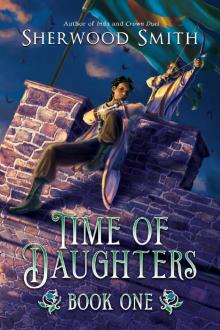 Time of Daughters I
Time of Daughters I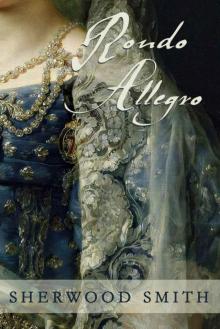 Rondo Allegro
Rondo Allegro Coronets and Steel
Coronets and Steel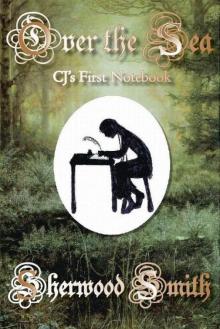 Over the Sea
Over the Sea Senrid
Senrid Hunt Across Worlds
Hunt Across Worlds A Sword Named Truth
A Sword Named Truth The Fox
The Fox Twice a Prince
Twice a Prince Fair Winds and Homeward Sail: Sophy Croft's Story
Fair Winds and Homeward Sail: Sophy Croft's Story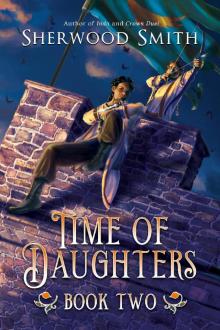 Time of Daughters II
Time of Daughters II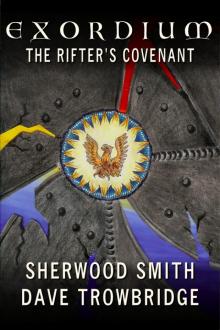 The Rifter's Covenant
The Rifter's Covenant The Phoenix in Flight
The Phoenix in Flight Stranger
Stranger The Thrones of Kronos
The Thrones of Kronos A Prison Unsought
A Prison Unsought Twice a Prince: Sasharia En Garde Book 2
Twice a Prince: Sasharia En Garde Book 2